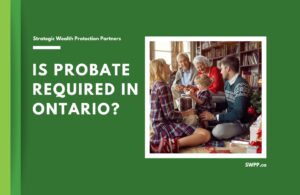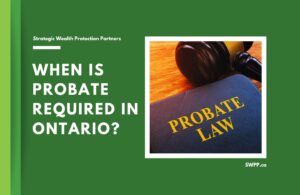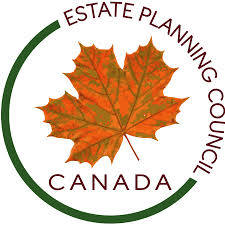Written by Ron Cooke, President & Founder of Strategic Wealth Protection Partners in Ontario, CEA®, Member of the Estate Planning Council Canada
Giving a House to Your Kids without Paying Taxes
Q: Can I Gift a House to My Son or Daughter Without Paying Taxes in Canada?
Transferring property to your children is a thoughtful way to provide for their future, but tax rules in Canada make it more complicated than simply handing over the keys.
Whether you’re gifting or selling your home, it’s important to understand the tax implications to avoid costly mistakes. In Canada, while there is no inheritance tax, “gifting” a property doesn’t mean it’s tax-free.
Keep reading to find out the pros and cons of giving your home including dealing with capital gains tax and land transfer tax.

Can I Gift a House to My Adult Kids Without Paying Taxes?
Yes, you can gift a house to your children, but in Canada, “gifting” a property doesn’t mean it’s tax-free.
When you transfer ownership of a property, the Canada Revenue Agency (CRA) treats it as if you sold the home at fair market value. This means you could face capital gains tax if the home has increased in value since you bought it.
The exception? If the home is your primary residence, you may be able to use the Principal Residence Exemption (PRE) to eliminate capital gains tax. However, if it’s a rental, vacation home, or investment property, capital gains tax will apply—possibly creating a significant tax bill.

What Are the Tax Implications of Gifting a House?
The biggest tax issue when gifting a house is capital gains tax.
In Canada, if your home has appreciated in value, you may have to pay tax on 50% of the capital gain, which is added to your income for the year.
Additionally, while Ontario generally does not charge land transfer tax on gifts between parents and children, if there is an outstanding mortgage on the home, your child may have to pay land transfer tax on the remaining balance.
It’s also important to consider future tax consequences.
If your child receives the home as a gift, their cost base for capital gains is considered to be the home’s fair market value at the time of transfer. This means they will be responsible for capital gains tax when they eventually sell the property.
How Do I Transfer Property to a Family Member Tax-Free in Canada?
The only way to transfer a property without triggering taxes is if it qualifies under the Principal Residence Exemption—meaning it has been your primary home for all the years you’ve owned it.
For secondary residences, the tax-efficient options include:
- Transferring property gradually over several years to spread out capital gains tax
- Using a trust to hold the property and control when and how it transfers
- Selling at fair market value and structuring payments over time to minimize tax impact
Careful planning with an estate professional can help reduce or defer taxes, making sure the transfer benefits your family rather than costing them more in the long run.
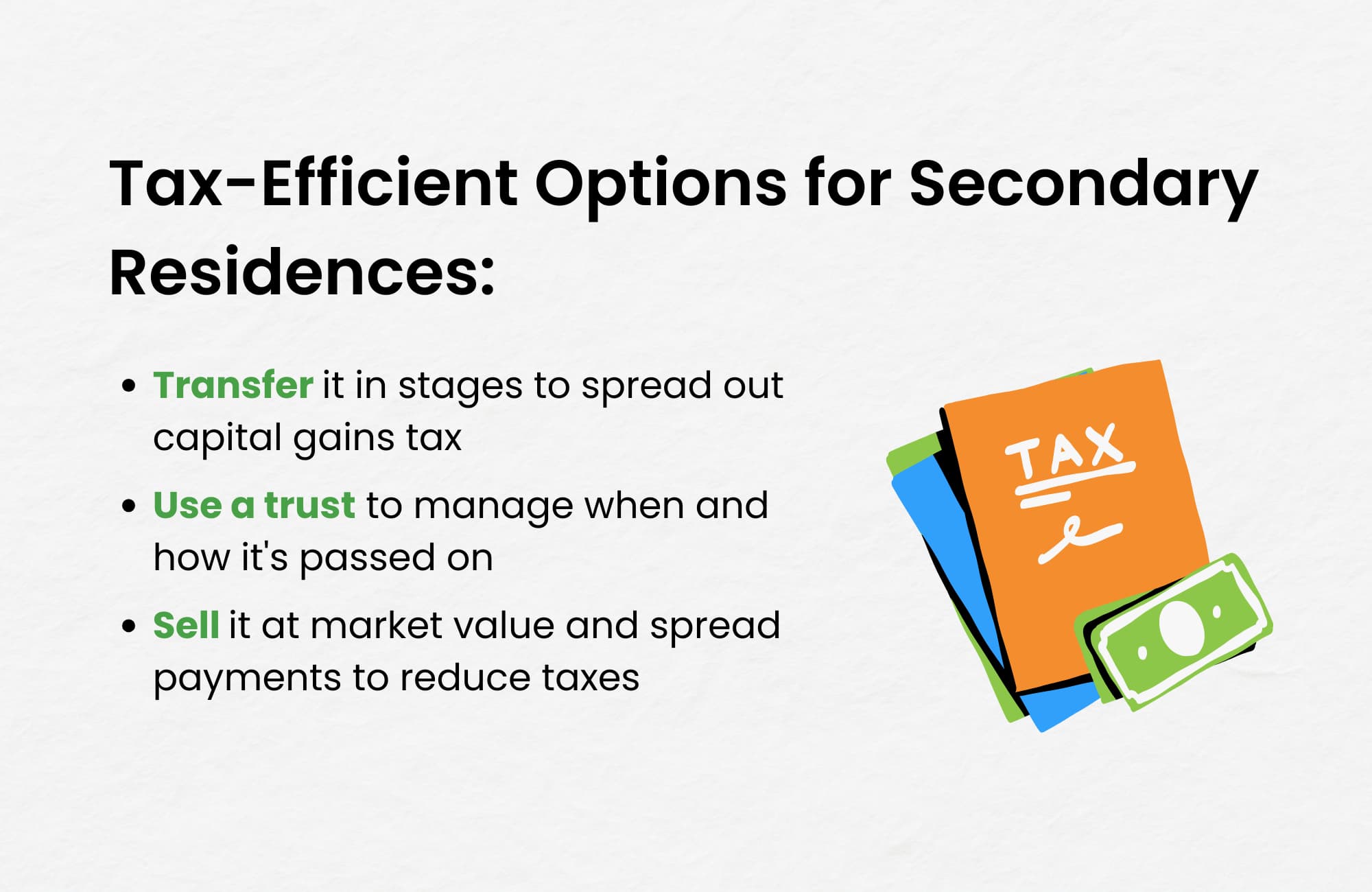
What Is the Best Way to Transfer a Primary Residence to Adult Kids?
If your home qualifies as a primary residence, the best way to transfer it is to gift it during your lifetime, allowing you to use the Principal Residence Exemption and avoid capital gains tax.
Another option is joint ownership with right of survivorship, which allows the home to pass to your children automatically when you pass away without going through probate.
However, this can come with risks—such as exposing the home to your child’s debts, divorce settlements, or future legal claims. In some cases CRA is challenging estates where the property is restructured to a joint owner to save taxes.
A more secure strategy is to use estate planning tools like a trust or life insurance to ensure your home is transferred efficiently and with minimal risk.
What Is the Best Way to Transfer a Secondary Residence to Adult Kids?
Unlike a primary residence, transferring a secondary property—such as a cottage, rental property, or vacation home—almost always triggers capital gains tax.
The longer you’ve owned the property, the higher the tax liability may be.
Some tax-efficient ways to transfer a secondary home include:
- Gradual gifting over time to spread out capital gains tax
- Setting up a trust to control ownership transfer while reducing tax impact
- Using life insurance to cover future tax liabilities, ensuring your children aren’t forced to sell the property to pay taxes
The best approach depends on your family’s financial goals. Without proper planning, your heirs could face a large tax bill and possibly have to sell the property to cover costs.
Can I Sell My House to My Son or Daughter for $1?
Yes, you can sell your home to your child for $1—but it’s a bad idea from a tax perspective.
The CRA will not recognize the $1 sale price and will instead assess the transaction at fair market value. This means that if the home has increased in value since you purchased it, you could still be responsible for capital gains tax as if you had sold it at full market price.
Additionally, your child’s cost base would be considered $1, meaning they could face a massive capital gains tax bill when they eventually sell the home.
A better approach is to sell at fair market value but structure payments in a tax-efficient way, or use estate planning tools like trusts to protect both you and your children from unnecessary tax burdens.
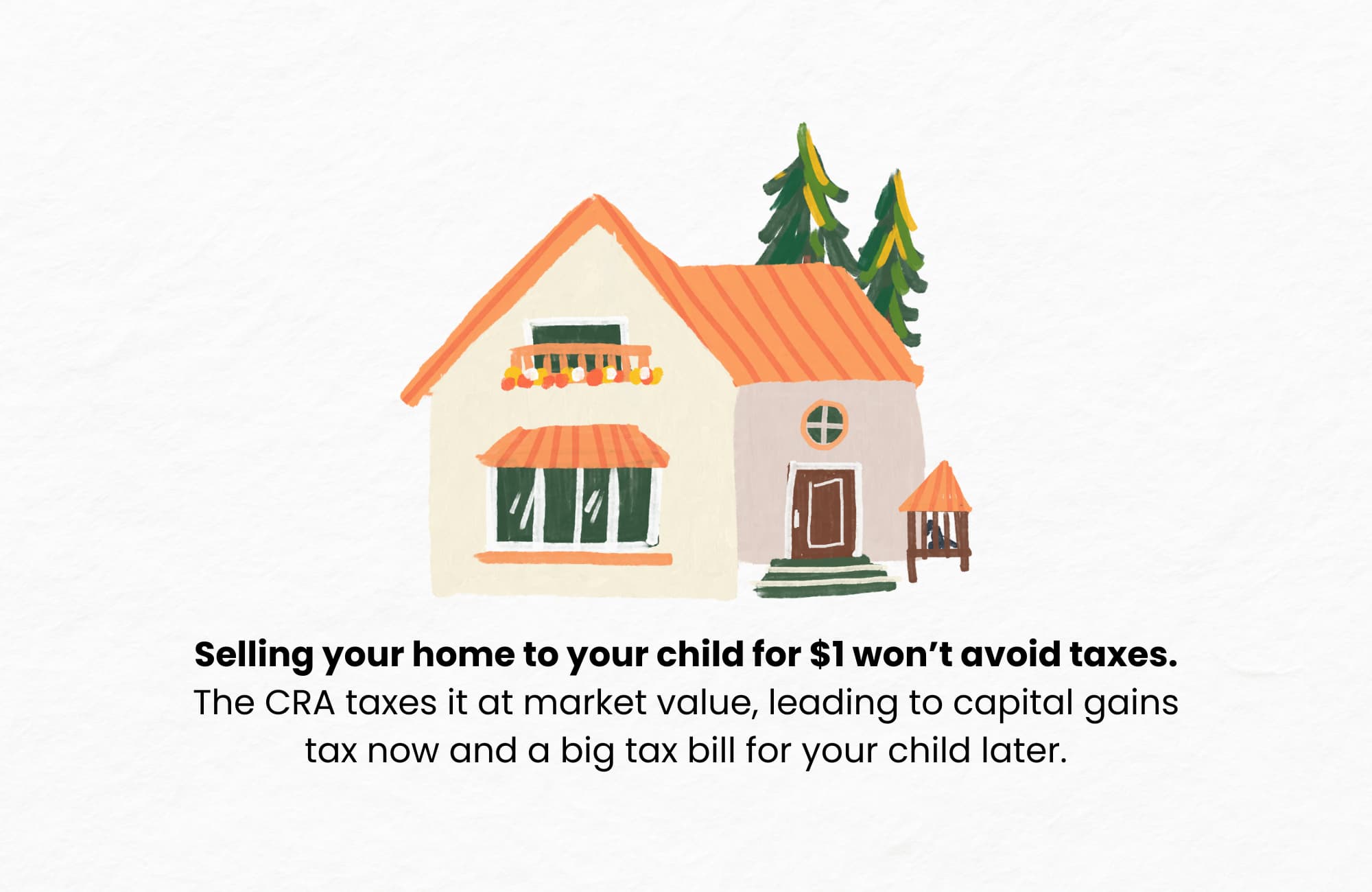
Final Thoughts
Gifting or transferring a home to your children can be a great way to secure their future, but without proper planning, it can also create unexpected tax liabilities and financial headaches.
A well-structured estate plan can:
- Minimize capital gains tax
- Avoid probate and land transfer tax
- Ensure a smooth transition of property ownership
Every situation is unique, and planning ahead with the right strategies can save your family thousands of dollars in unnecessary taxes and legal fees.
Want to explore the best approach for your family? Let’s talk—proper planning ensures your wealth stays where it belongs: in your family’s hands.
Discover How to Minimize Taxes and Secure Your Legacy
Did you know that without a solid estate plan, taxes and fees in Ontario could claim a significant portion of your wealth?
If you’ve worked hard to build your business, investments, and properties, protecting your legacy for your loved ones is critical. At Strategic Wealth Protection Partners, we specialize in helping high-net-worth individuals in Ontario secure their financial futures.
Our Living Estate Plan is designed to:
- Reduce estate taxes and probate fees.
- Simplify wealth transfer to your loved ones.
- Reflect your values and priorities in every detail.
Your Legacy Matters
With our personalized guidance, we’ll help you navigate options like Living Trusts to protect your assets and ensure your family’s peace of mind. Contact us today to book your Living Estate Plan Consultation and take the first step toward a secure future.
Schedule a Living Estate Plan Consultation
Planning your legacy is about more than numbers—it’s about ensuring your family remembers you and your values are honoured for many years to come.
Estate planning and trusts can feel overwhelming, especially if it’s your first time. That’s why we’re here.
With our simple, 5-Step Living Estate Plan, we make the process easy, helping you create a comprehensive estate plan or trust that protects your assets from taxes and probate fees while preserving your legacy. Tools like The Final Word Journal capture your story, wishes, and essential details like accounts and end-of-life plans, ensuring your family has clarity and comfort.
Take the first step today—schedule a consultation call and give your family the ultimate gift: peace of mind and the assurance they were always your priority.
Read More
If you’re starting your estate planning process, you may find these articles helpful:
- How to Avoid Estate Tax in Canada
- Do Beneficiaries Pay Tax on Inheritance in Canada?
- How Do I Avoid Capital Gains Tax on Inherited Property in Canada?
About the Author
RON COOKE, PRESIDENT & FOUNDER OF STRATEGIC WEALTH PROTECTION PARTNERS

With over 30 years in financial services, I’ve seen the challenges families face when a loved one passes—lost assets, unnecessary taxes, and emotional stress. That’s why I created the Living Estate Plan, a comprehensive process to protect assets, eliminate estate and probate fees, and create legacies that are remembered for many years to come.
This plan ensures your family receives not just your wealth, but a meaningful reminder of your care and love. Tools like The Final Word Journal capture your story, wishes, and essential details, offering clarity and comfort during difficult times.
Your final gift should be more than money—it should be peace of mind, cherished memories, and an organized estate.
Schedule a Call
Schedule a 30-minute consultation call with Strategic Wealth Protection Partners.
Click HERE to schedule a consultation.


